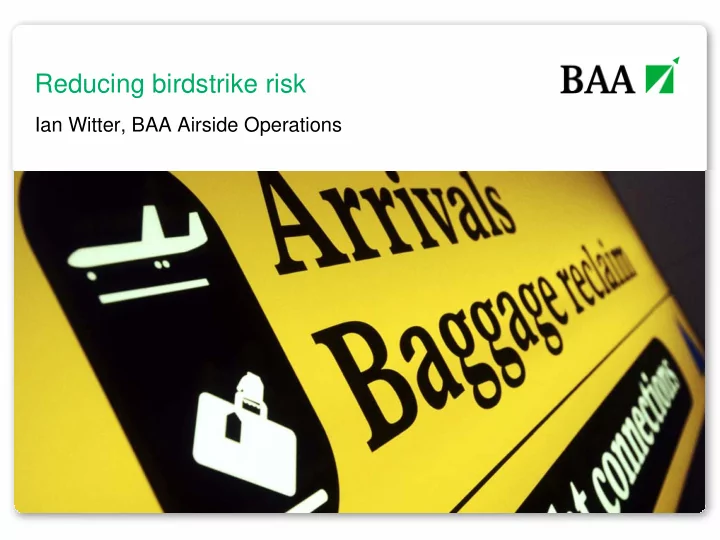

Reducing birdstrike risk Ian Witter, BAA Airside Operations
Reducing birdstrike risk � You cannot guarantee to prevent birdstrikes, but you can do things to reduce the risk. � Numbers of birdstrikes do not tell you much about the risk � Operators can help – please report birdstrikes � If you or your Engineers find bird remains please contact the airport to enable species identification.
Norwich 1973 – legal case
Ciampino Rome November 2008 Ryanair birdstrike at Rome November 2008
Second birdstrike causing hull loss on twin
Bird Control � On site, continuous bird patrol, mobile in a vehicle � Trained staff � Equipment to scare birds – distress calls, shellcrackers � Log all activity � Include off airport monitoring of known attractants and overflights
Species observations M ain Species Activity Levels Total Numbers 15000 10000 Seen Rook 5000 Starling 0 Lapwing April Aug Aug Oct Feb June Dec M onth O th e r S p e c ie s A c tiv ity L e v e ls Total Number seen 6 0 0 W .P ig e o n F .P ig e o n . 4 0 0 M a g p ie 2 0 0 G u ll 0 H e ro n April Aug Aug Oct Feb June Dec M o n th
Habitat Management � Key factor is to understand and reduce attractiveness of airport � Grass management � long grass policy, 15-20cm, regular topping cuts � Bottoming out spring, dense thick upstanding sward � Fertiliser, Herbicide, Insecticide – soil sampling � Management plan to reduce attractiveness � net water bodies � bird proof buildings etc etc
Risk Assessment for each airport � Historical strike data � Birdstrike species identification – very important – you can help! � Probability - based on average number of strikes � Strikes over 5 years, average per rolling 5 years by species � Severity - UK National damage figures for each species � Matrix – High/Med/Low – Red/Amber/Green � Purpose is to prioritise to reduce damaging birdstrikes � BAA uses the measure – the number of birdstrikes with species classed as high or medium risk each month or year. � This better describes the risk than using the total number of birdstrikes,
Risk Matrix SEVERITY PROBABILITY Very High Moderate Low Very Low High Very High Grey Heron Canada Geese Cormorant High Large gulls Pheasant Oystercatcher Moderate Rook Lapwing Mallard Woodpigeon Feral Pigeon Low Small gulls Stock Dove Starling Kestrel Very Low Skylark Swift Swallows eg low/high geese airport strikes
Audits & Safeguarding � Internal BAA audits � CAA Aerodrome Licensing audits � FERA detailed risk assessment and standards check every year � check bird control skills, techniques, equipment � check off-airport attractants and monitoring regime � Safeguarding process � Town and Country Planning � Consulted on proposed new developments – bird management plans � 10 in place, plus hundreds of flat roof planning conditions (gulls)
LHR T5 balancing pond Bird Balls No life, levels change
FERA Geomarine Bird Radar
Aberdeen Gull Working Group – Radar results
Summary � Key Aspects of Achieving a Reduction in Risk include; � Habitat management � Bird control � Birdstrike recording and species identification � Risk assessment � Audit and inspection � Detailed specific studies � Safeguarding
High/medium risk birdstrikes at BAA’s 7 airports N u m b er o f H ig h /M ed iu m R is k B ird S trik es - A ll 7 lo c a tio n s 1 2 0 1 0 8 9 4 1 0 0 8 9 8 0 7 1 6 6 6 0 4 0 2 0 0 2 0 0 4 2 0 0 5 2 0 0 6 2 0 0 7 2 0 0 8
Websites etc � Website IBSC - www.int-birdstrike.org � USA –www.birdstrike.org � Canada – www.birdstrikecanada.com � Conferences – North America / Canada joint birdstrike conference � Next week in Vancouver � IBSC September 2010 Australia 21-24 September, Cairns
Recommend
More recommend